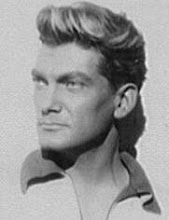






The career of ace Hollywood cinemaotographer Russell Metty is full of interesting twists and turns. His first full credit dates back to 1934 and three years later his first big success, Bringing Up Baby, marked the start of a twenty year period of solid yet imaginative work as a contracted Hollywood cameraman. Subject to the whims of various directors and an industry obsessed with over-lighting, Metty only had occasional opportunities to show the full range of his skills, The Stranger (1946), Ivy (1947) and The Lady Gambles (1949) are noteworthy examples. 'The Stranger' is a significant film for Metty marking his first 'official' collaboration with Orson Welles. Welles was notoriosly furious when RKO re-cut and shot extra scenes for the Magnificent Ambersons, feeling betrayed, his anger focussed on Robert Wise the stand-in director, marking a lengthy feud between the two men. Ironically, he was highly impressed by Metty's photography and used him on The Stranger and, arguably, his greatest movie, A Touch of Evil (1958). Metty's stunning black and white camerawork is absolutely fundamental to the claustrophobic, menacing atmosphere of the film. Showing another side to his talent, Metty provided luscious technicolor images on Douglas Sirk's landmark fifties weepies, Magnificent Obsession (1954), All That Heaven Allows (1956), and Imitation Of Life (1959). Any of these films could have won him an Oscar but it was to be Spartacus (1960) that earned him the award and therein lies another twist. Originally hired by Anthony Mann, Metty was virtually pushed out of his chair by substitute director, Stanley Kubrick. Formerly a cameraman himself, Kubrick took over the reins to both direct and photograph the film. Thus, it must have been a strange sensation to receive such a prestigious award for a film he only partially shot.
Russell Metty continued to produce fine work during the sixties later moving into TV, notably on Columbo and even the Waltons for which he received an Emmy nomination. He died in 1978.

No comments:
Post a Comment